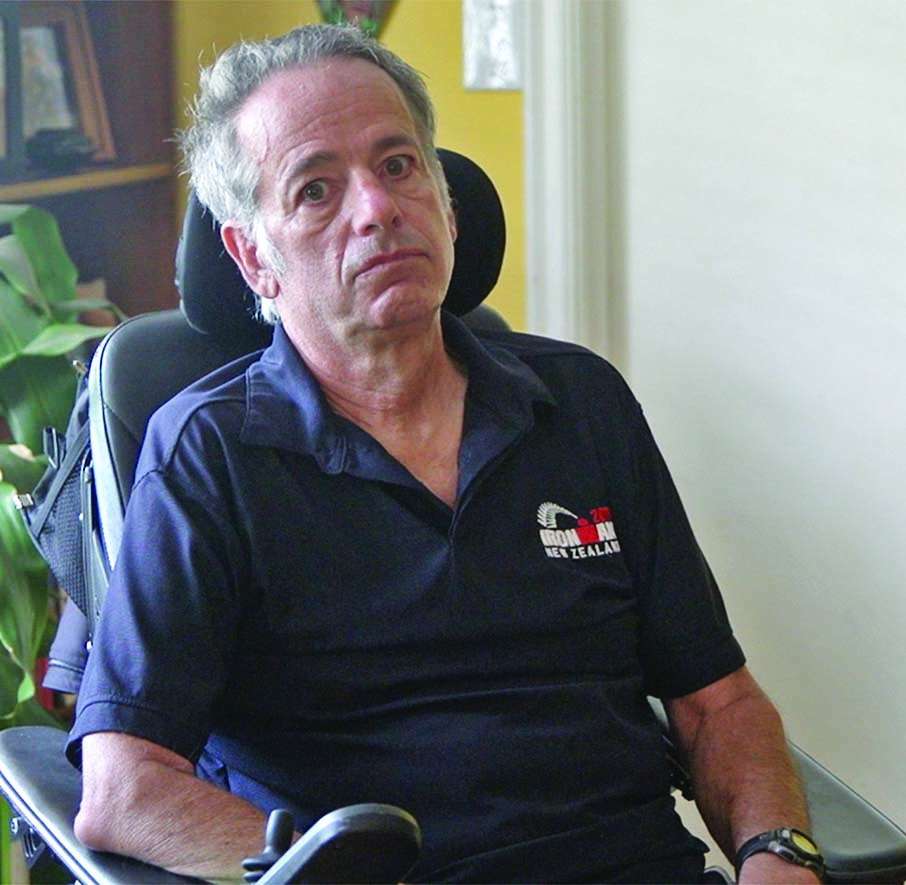Should Terminal Patients Be Allowed to Try Experimental Drugs?
"Right to try" laws offer hope for people trying to save their own lives.

In 2013, David Huntley got the diagnosis: He had amyotrophic lateral sclerosis (ALS), commonly known as Lou Gehrig's disease.
In addition to being a professor emeritus in the Department of Geological Sciences at San Diego State University, Huntley had been a marathoner, a scuba diver, and an Iron Man triathlete. For someone used to staying active, the illness—which degrades control over muscles, inhibiting walking, speaking, eating, and ultimately breathing—was hard to accept.
"The horror of this disease is the months and years leading up to the end," he told Reason TV in April. "Day by day you lose your dignity, your independence, your ability to move anything but your eyes."
ALS is fatal—we have no cure, and most people survive for just two to four years from its onset. There is, however, a promising new drug called GM604, which is currently undergoing clinical trials. Out of other options, Huntley sought access to the medication, but because it hasn't yet been approved by the Food and Drug Administration (FDA), he was denied.
"How is keeping a potentially life-saving drug from me saving my life?" he said at the time. "GM604 may fail to stop the progression…or it could extend my life and even restore some of the function I have lost. But at the very least, it [would give] me something with which to fight back against this horrendous disease."
On July 4, 2015, Huntley died of respiratory failure.
Starlee Coleman doesn't think anyone should have to go through what Huntley did. So as a senior policy advisor at the Arizona-based Goldwater Institute, she helped author a piece of legislation to do something about it. The bill, known as Right to Try, gives terminal patients "the ability to go around the FDA, essentially, in an effort to save their own lives." It has become the basis for laws in 23 states; 13 more are actively considering passing measures to extend a Right to Try to patients within their jurisdictions.
One of the reasons for the laws' stunning success rate is that they are narrowly tailored, applying only to treatments that have already made it past the first stage of federally mandated clinical trials. "One of the pieces of Right to Try is that drugs that are eligible for access have to be continuing to go through the FDA approval process," Coleman explains.
The agency denies that such efforts are necessary. In a written statement provided to reason, the FDA claims it already makes experimental treatments available to patients who are dying, through something called the Expanded Access Program. But according to Coleman, that "accelerated" program only shortens the process for getting drugs to humans from an average of 10 years to an average of 7. It's simply too slow to help patients suffering from diseases like ALS that tend to kill quickly.
As the FDA website lays out, before an investigational drug can be provided to a patient, the supervising physician has to submit a formal application, and then an "institutional review board," or ethics committee, has to evaluate the situation. In addition to paying for the drug itself, the patient may be required to foot the bill for that review. And after all that, there's still no guarantee the committee will give its approval to the request.
It's a process that doesn't sit well with a lot of people. As Huntley put it before his death, "The decision to use an investigational drug to fight a fatal disease should be between a patient and his or her doctor."
"In a situation where you've been diagnosed as terminally ill and none of the treatments that are on the market today are working for you," Coleman says, "you shouldn't have to fight the government too."
This article originally appeared in print under the headline "Should Terminal Patients Be Allowed to Try Experimental Drugs?."


Show Comments (2)